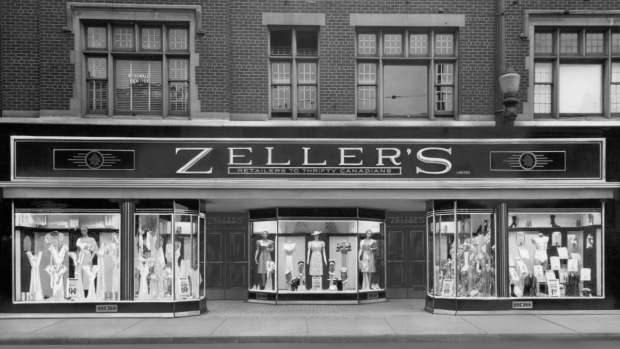Oct 4, 2019
Five burning questions as Zellers' final two stores set to close
By Paige Ellis
Zellers’ closure of last two stores spurs nostalgia, confusion
Eight years after Hudson’s Bay Co. announced plans to sell the bulk of its Zellers leases to Target Corp., the retailer is finally preparing to shutter its last two locations. HBC confirmed a Zellers store in Etobicoke, Ont. and another in Ottawa will close in early 2020.
The news has drawn confusion and nostalgia from Canadians – many of whom remember the quirky department store chain fondly, but thought it was long gone.
Here are five questions (and answers) to what you may be wondering about Zellers' final exit.
Wait, I thought Zellers shut down years ago. What’s with these two locations?
When HBC and Target announced their $1.8-billion deal in 2011, the Canadian retailer further revealed that all Zellers locations not purchased by the U.S. department store giant would close by March 2013.
But three stores survived across the country – one in Montreal (which closed in 2014), one in Etobicoke and another in Surrey, B.C. (which also later closed).
HBC spokesperson Tiffany Bourré told BNN Bloomberg the Ottawa location shuttered but was later reopened.
The remaining locations have served as liquidators for products that didn’t sell out at The Bay, according to Lisa Hutcheson, a retail expert and managing partner at J.C. Williams Group.

The entrance of one of Zellers' last stores, located in Etobicoke, Ont., as it prepares to close early next year. (Paige Ellis/BNN Bloomberg)
Why are the final two Zellers locations closing now?
In an emailed statement to BNN Bloomberg, Bourré explained that HBC evaluated the stores’ “performance and other factors” and deemed it “necessary” to close the two locations.
Though unrelated to the Zellers closures, the retailer has been reducing its global footprint in recent years to narrow its focus on two of its key assets: Saks Fifth Avenue and Hudson’s Bay.
In August, HBC announced plans to sell Lord & Taylor and last month confirmed plans to exit the Netherlands.

Appliances for sale at a Zellers store in Etobicoke, Ont. as it prepares to close in early 2020.
How many employees will be affected as a result of the Zellers closures?
HBC did not immediately respond to a request for information about the number of employees affected by the closures.
Bourré said eligible Zellers associates will receive severance packages, and some may be offered opportunities to work elsewhere within the HBC network.

A Zellers storefront in Saint Catharines, Ont. in 1942. (Courtesy of HBC Corporate Collection)
Why did Zellers fail?
Zellers launched during the Great Depression and grew rapidly across Canada. According to HBC’s History Foundation, annual sales climbed to nearly half a billion dollars by the late 1970s, and surpassed $1 billion in 1983.
“Zellers was one of the first to have a restaurant in the stores,” said Hutcheson. “[They had] one of the first loyalty programs with Club Z, and then [they introduced] Zeddy, the teddy bear.”
The turning point came in 1994, when Walmart Inc. acquired 122 Woolco stores and opened its first-ever Canadian locations.
Hutcheson said Zellers simply couldn’t compete with Walmart’s deep supply chain and strong brand.
“Walmart had better service levels, they had greeters, they understood the customer,” she added.
Zellers’ efforts to win back customers, including introducing fresh food and exclusive brands, never gained traction. In 2011, HBC announced its deal to sell the leases of 189 Zellers stores to Target, and began the process of shutting down.
Target ultimately suffered the same fate as Zellers. Just two years after its launch, the U.S. chain announced that it was exiting Canada and retreated across the border.
What happened to Zeddy the mascot?
Zellers’ beloved mascot Zeddy was kicked to the curb when the retailer announced plans to close the banner.
Well, technically, he was kicked to the woods.
As part of a popular final marketing campaign for the Zellers’ closing sale, Zeddy the bear was released into the wild.
“But this was a domesticated bear,” Angus Tucker, chief creative officer at advertising agency John St., told BNN Bloomberg in an interview. “He wasn’t built for surviving in the wild of Canada.”
And so ensued a sometimes-nostalgic, always-wry farewell to Zeddy and Zellers.
“In many towns, Zellers was the only department store,” said Tucker. “In a way, [the ad campaign] was kind of like a two-year wake for the death of a brand.”
Fortunately, Zeddy wasn’t forced to adapt to Canada’s unforgiving outdoors. He was adopted and renamed “Barry” by Camp Trillium, a charity that offers recreational activities to families impacted by childhood cancer.




